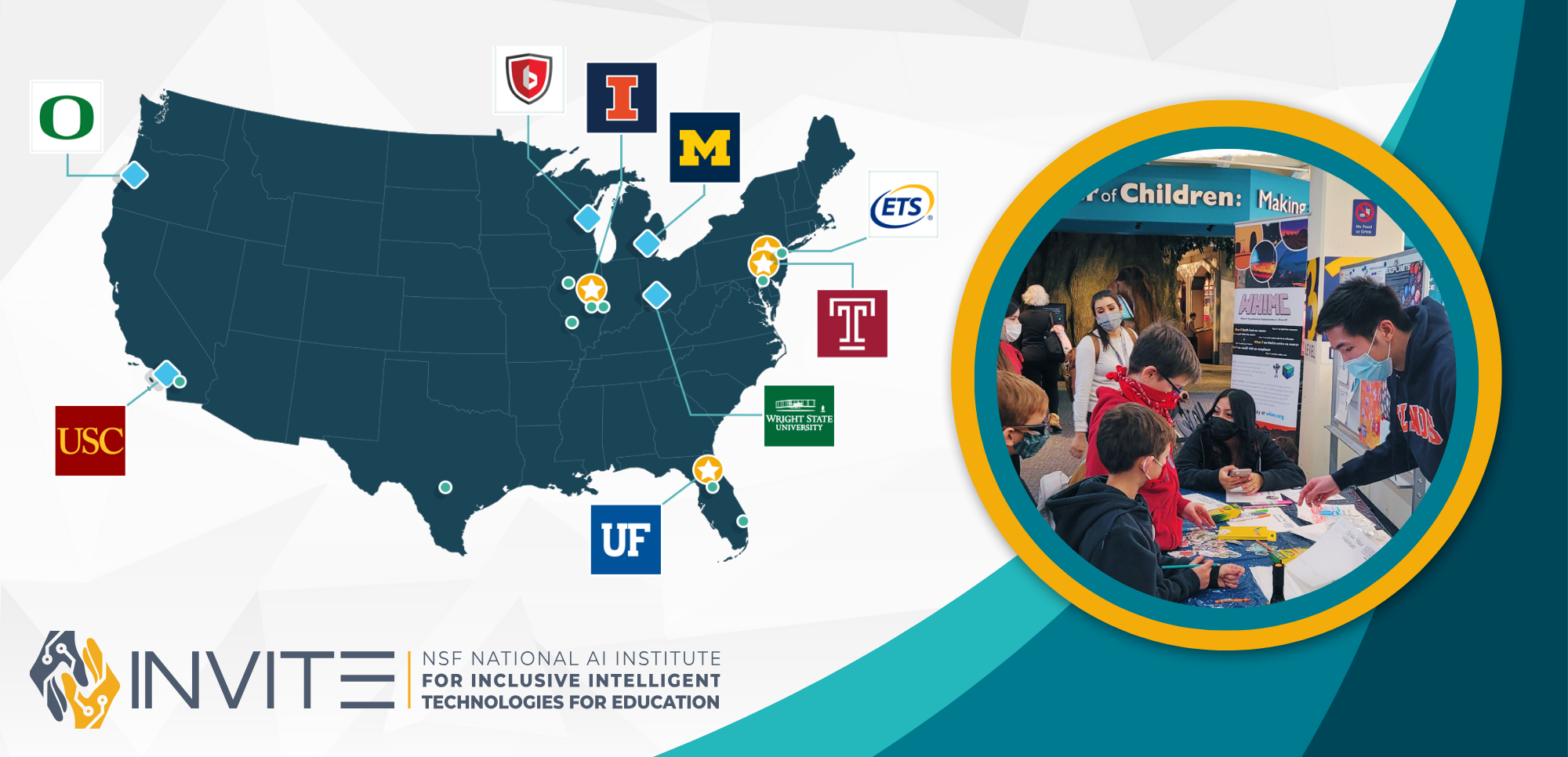
INVITE Institute - Innovative Intelligent Technologies for Education
INVITE seeks to fundamentally reframe how AI-based educational technologies interact with learners. We develop AI techniques to track and promote skills that underlie successful learning and contribute to academic success: persistence, academic resilience, and collaboration.
Project Introduction
This NSF AI Research Institute is inventing, investigating, and deploying novel AI-augmented learning technologies and foundational AI techniques to address the needs of learners who are underserved and underrepresented in STEM. INVITE brings together a highly interdisciplinary and internationally-recognized team of researchers with expertise in AI, the learning sciences, psychology, and broadening participation with a network of diverse schools, districts and community partners to pursue these critical challenges. INVITE’s long-term research vision is to lay a foundation for a new generation of AI-augmented learning that supports learners in holistic ways.
Project Description
INVITE’s research is pursuing foundational AI advances in robust and fair machine learning, cognitive architectures, and natural language understanding and use-inspired research focusing classroom integration of a suite of INVITE STEM learning platforms. Research will revolve around three interconnected strands: (1) Collect, analyze, and share novel datasets for AI to enable foundational AI advances in fair and robust machine learning and natural language understanding. Driving principles will emphasize representativeness, consistency, and shareability; (2) Build novel, robust methods for understanding learner behaviors and persistent, integrated learner models that incorporate novel assessments of noncognitive skills. (3) Develop new innovative, socially-aware STEM learning environments that provide natural and adaptive interaction with socially aware pedagogical agents.
Learn more at the INVITE Institute website.
publications
| 2025 | |
| [9] | Virtual Characters Help K--12 Students Learn and Improve Motivation: A Meta-Analysis. Noah L. Schroeder, Shan Zhang, Chris Davis Jaldi, Jessica R. Gladstone, Alexis A López, Emmanuel Dorley. Review of Educational Research, 2025, pp. 00346543251389930. [bib] [doi] |
| [8] | Towards Assessing Persistence in Reading in Young Learners Using Pedagogical Agents. Caitlin Tenison, Beata Beigman Kelbanov, Noah L. Schroeder, Shan Zhang, Michael Suhan, Chuyang Zhang. Proceedings of the Artificial Intelligence in Measurement and Education Conference (AIME-Con): Full Papers, 2025, pp. 82-90. [bib] [doi] |
| [7] | Do Pedagogical Agents Enhance Student Motivation? Unraveling the Evidence Through Meta-analysis. Jessica R. Gladstone, Noah L. Schroeder, Steffi Heidig, Shan Zhang, Chris Palaguachi, Marcin Pitera. Educational Psychology Review, vol. 37 no. 3, 2025, pp. 72. [bib] [doi] |
| [6] | How Virtual Agents Can Shape Human-Human Collaboration: A Systematic Review. Toni V. Earle-Randell, Shan Zhang, Noah Schroeder, Kristy Elizabeth Boyer, Emmanuel Dorley. Proceedings of the 26th International Conference on Artificial Intelligence in Education, 2025, pp. 468-486. [bib] [doi] |
| [5] | Education in the era of Neurosymbolic AI. Chris Davis Jaldi, Eleni Ilkou, Noah Schroeder, Cogan Shimizu. Journal of Web Semantics, vol. 85, 2025, pp. 100857. [bib] [doi] |
| [4] | Can LLMs Reliably Simulate Human Learner Actions? A Simulation Authoring Framework for Open-Ended Learning Environments. Amogh Mannekote, Adam Davies, Jina Kang, Kristy Elizabeth Boyer. Proceedings of Educational Advances in Artificial Intelligence AAAI/EAAI Conference (EAAI-2025), 2025, pp. 29044-29052. [bib] |
| 2024 | |
| [3] | Semi-automating the Scoping Review Process: Is it Worthwhile? A Methodological Evaluation. Shan Zhang, Chris Palaguachi, Marcin Pitera, Chris Davis Jaldi, Noah Schroeder, Anthony Botelho, Jessica Gladstone. Educational Psychology Review, vol. 36, 2024, pp. 1-35. [bib] [doi] |
| [2] | Large language models for whole-learner support: opportunities and challenges. Amogh Mannekote, Adam Davies, Juan D. Pinto, Shan Zhang, Daniel Olds, Noah L. Schroeder, Blair Lehman, Diego Zapata-Rivera, ChengXiangSong Zhai. Frontiers in Artificial Intelligence, vol. 7, 2024, pp. 1460364. [bib] [doi] |
| 2023 | |
| [1] | How Noisy is Too Noisy? The Impact of Data Noise on Multimodal Recognition of Confusion and Conflict During Collaborative Learning. Yingbo Ma, Mehmet Celepkolu, Kristy Elizabeth Boyer, Eric Wiebe, Collin F. Lynch, Maya Israel. Proceedings of the 25th ACM International Conference on Multimodal Interaction (ICMI23), 2023, pp. 326-335. [bib] |

